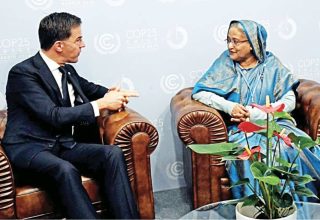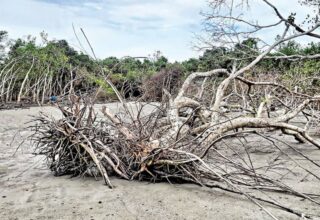
The science of climate change is assessed every six or so years under the aegis of the Intergovernmental Panel on Climate Change (IPCC), which was set up several decades ago by the United Nations Environment Programme (UNEP) and the World Meteorological Organisation (WMO)—and it consists of the governments of all UN member states.
The IPCC does this assessment by inviting leading scientists from around the world to study scientific literature and assess the latest developments in the science of climate change. It is important to note that the IPCC does not do new research itself, but rather assesses the existing body of scientific research and gives its assessment to the governments, who have the responsibility of approving the final Summary for Policy Makers (SPM) based on the underlying scientific report.
It is also important to explain that the IPCC is divided into three Working Groups of which the first (WG1) assesses the status of climate science, the second (WG2) assesses the status of impacts, vulnerability and adaptation, while the third (WG3) assesses the status of actions to tackle climate change by mitigation as well as adaptation.
The IPCC is currently reporting its sixth assessment report and, last Monday, the final report of WG1 was released with much fanfare. I had the privilege of being a lead author of the IPCC’s third, fourth and fifth assessment reports and have been closely associated in contributing to the IPCC’S WG2 for many years. As such, I am sharing my take on the major outcomes of the recently released WG1 report of the IPCC’S Sixth Assessment Report (AR6).
The first message is the clear and unequivocal statement that human-induced climate change, due to the emissions of greenhouse gases over nearly 200 years, has now definitely raised global mean temperature by over one degree Celsius and that this has already caused many extreme weather events such as heatwaves, wildfires, floods and cyclones that are much more severe than they otherwise would have been.
This is a significant breakthrough in the attribution science for severe weather events, which in the past took a lot of time after the event was over for the scientists to give their verdict on whether they were indeed made more severe because of human-induced climate change. These scientists are now able to make these attributions more quickly, as was demonstrated in the last couple of weeks with the heatwave in north-west US and Canada, as well as the wildfires in Greece and Turkey and floods in Germany and China.
In fact, it is probably correct to say that from now on, every record-breaking extreme weather event can be reasonably attributed to having been exacerbated by human-induced climate change. This is in effect ushering in a new era of loss and damage from human-induced climate change for the foreseeable future for all of humanity.
The second major finding of the AR6 is that the global temperature goal of staying below 1.5 degrees Celsius is slipping away rapidly, and unless drastic actions are taken immediately, we may cross that key threshold within a decade. This means we must enhance the urgency of action in moving away from fossil fuels like coal, petroleum and natural gas as quickly as possible to renewable energy in every country. This means that the Nationally Determined Contribution (NDC), which all countries have submitted or are still about to submit, needs to be truly ambitious to ensure that the 1.5 degree Celsius threshold is not crossed.
The third and perhaps most important message is the possibility of irreversible changes in the physics of the global atmosphere, such as the complete destruction of the Atlantic conveyor system or the release of methane from below permafrost regions like Siberia. These will be such game-changing shifts that the results are completely unpredictable.
The above messages are part of the SPM, while the 4,000-page underlying report has more details of what are the possible climate change related impacts in every region of the world, including in South Asia and Bangladesh. One of the innovations introduced in this sixth assessment report is that location specific impacts data are now available for scientists in each country, including Bangladesh, to delve into. The impacts for the Ganges Brahmaputra river delta show the likelihood of more intense precipitation in the monsoon season, leading to more severe floods, while there could be less precipitation during the dry season, leading to more severe droughts.
The bottom line from the IPCC AR6 is that time is running out and actions have to be stepped up urgently by everyone, especially the governments who will be meeting at COP26 in Glasgow in November this year. There is not a moment to lose.
Originally this article was published on August 11, 2021 at Daily Star. The author Prof. Saleemul Huq is the director of the International Centre for Climate Change and Development (ICCCAD) at the Independent University, Bangladesh (IUB).
Email: saleemul.huq@icccad.org






